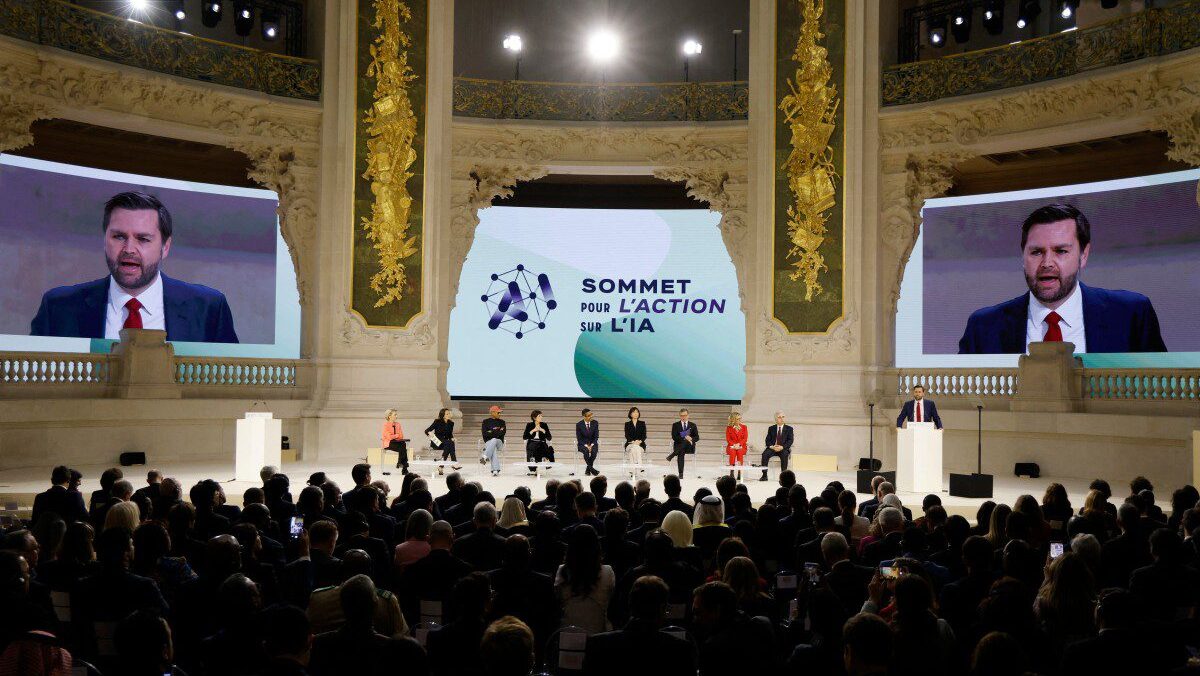
U.S. Vice President JD Vance addresses the Paris AI Summit, 11 February 2025
Ludovic Marin / AFP
U.S. Vice President JD Vance did not hold back during his keynote speech on the second day of the Paris AI Summit. While discussing the future of global artificial intelligence and digital regulation, Vance spent a long time subtly yet strongly criticizing the European Union’s overregulatory approach, ideologically biased social media censorship efforts, and climate policies that hurt the energy sector and foster deindustrialization.
In his speech on Tuesday, February 11th, the VP stressed that the true potential of AI technologies can only be unlocked inside an innovation-friendly regulatory environment, similar to the one in the U.S. He invited every country to follow this model.
With European Commission President Ursula von der Leyen sitting next to him on the podium, Vance referred to the EU’s overly “risk-averse” AI Act, stating
we need our European partners in particular to look to this new frontier [of AI development] with optimism, rather than trepidation.
Without naming them, he also criticized certain EU countries and the bloc in general for hindering the energy sector with unnecessary and destructive climate policies. The fourth industrial revolution of AI needs more cheap energy than ever, he said, “yet too many of our friends are deindustrializing on the one hand, and chasing reliable power out of their nations and off their grids with the other.”
The remark was a clear jab at Germany, in particular, which closed down all of its nuclear power plants and now sees key industries leaving the country as a consequence of spiking energy prices.
Still, what’s most “troubling” for Washington is that U.S. big tech companies are being targeted and hindered by “onerous international rules,” Vance said. He specifically called out Brussels’s Digital Services Act (DSA)—meant to police social media platforms for “so-called misinformation” under the threat of massive fines or even temporary suspensions in the EU—as well as the bloc’s data protection regulation (GDPR), which “strangles” smaller companies with unsustainable bureaucratic costs.
“America can not and will not accept” other governments “tightening the screws” on U.S. tech companies he said, least of all to advance an ideological agenda:
Of course we want to ensure the internet is a safe place, but it is one thing to prevent a predator from preying on a child on the internet, and it’s something quite different to prevent a grown man or woman from accessing an opinion that the government thinks is misinformation.
Vance's message to Europe on AI is crystal clear:
— Rosie Birchard (@RosieBirchard) February 11, 2025
-US "will not accept" foreign govts "tightening the screws" on US tech companies
-US is leader in AI & "plans to keep it that way"
-Namechecks & criticizes DSA+ GDPR
-Europe should approach with "optimism rather than trepidation" pic.twitter.com/LGHgFGDrwR
Similarly, Vance also warned that the Trump administration will never let American-made AI models be co-opted into tools of “authoritarian censorship.”
The vice president pointed at earlier image generator models in the U.S. that wanted users to believe that George Washington was black or that WWI infantrymen were in fact women. We may laugh at these examples now, but the lessons are worth remembering, Vance said, promising that the administration will ensure that U.S.-made AIs will remain free of ideological bias.
“We can trust our people to think, to consume information, develop their own ideas, and to debate with one another in the open marketplace of ideas,” he said.
After taking the stage, von der Leyen largely ignored everything that Vance said, except for subtly rejecting the VP’s call to have freedom-oriented regulatory frameworks on AI, like in the U.S. Von der Leyen said the EU is being told “too often” to follow the footsteps of others, and argued for a “distinctive” European approach.
She also announced that the EU will be investing €200 billion in AI, a response to Trump’s $500 billion Stargate project. But since the AI Act enters into force this month with critics saying it will seriously hinder innovation and development, the question is whether it’s worth investing in a race that’s already been lost—or in a giant cash pot that will be just flushed down the drain.
"We aim to mobilise a total of €200 billion for AI investments in Europe.
— European Commission (@EU_Commission) February 11, 2025
It will be the largest public-private partnership in the world for the development of trustworthy AI."
— President @vonderleyen at the Artificial Intelligence Action Summit pic.twitter.com/RoCqNqtg29
